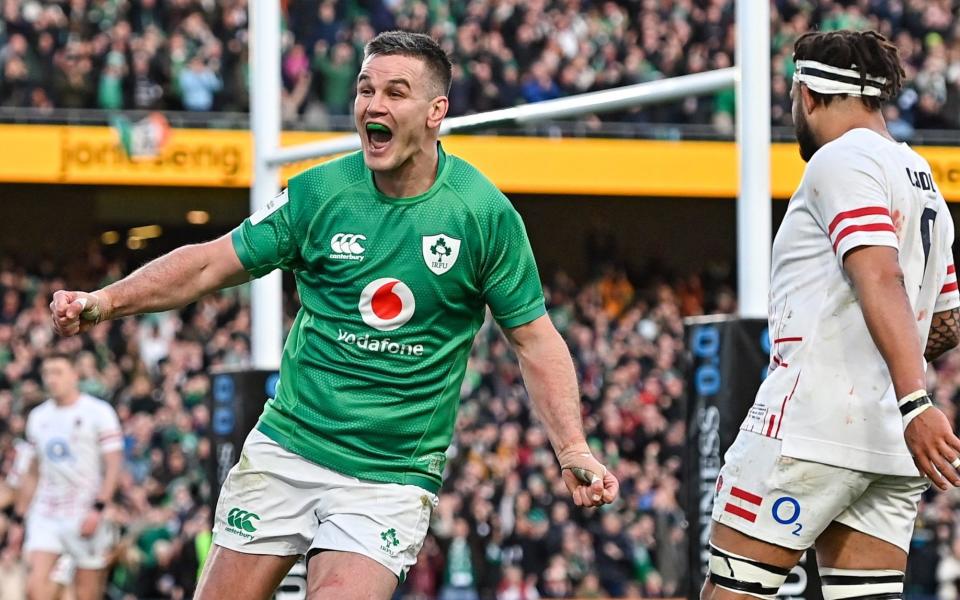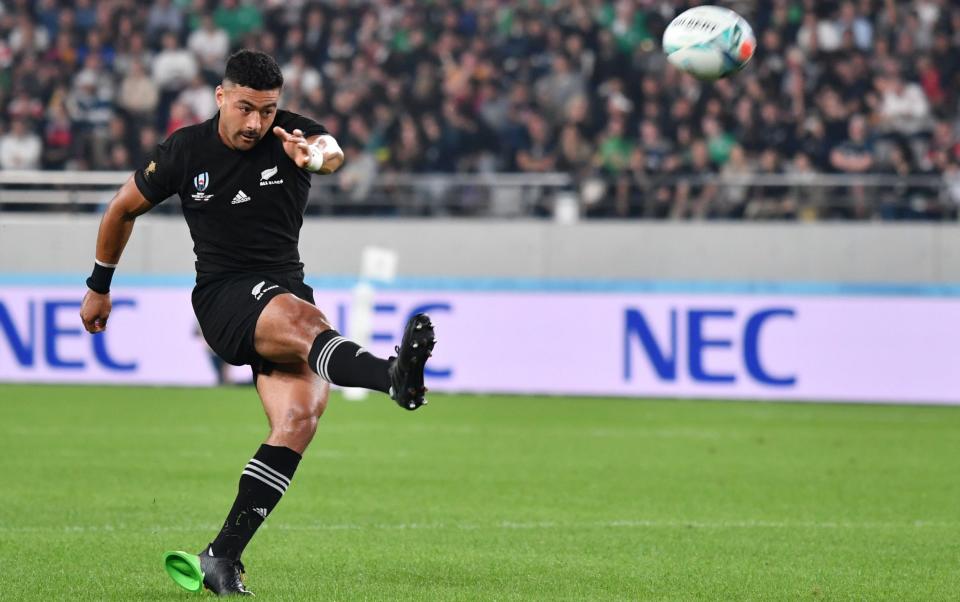Rugby finally has a fantasy World Cup game – here is the cheat sheet you need

Burger Odendaal is a flinty South African centre and before I knew what he looked like, I knew he was difficult to tackle. Such is the power of fantasy rugby, which could enhance your World Cup experience.
Odendaal was a thrifty midfield option in the Super Rugby Super Coach game, which I played avidly a decade ago. Then with the Bulls, he would return a steady stream of points thanks to his ability to shrug off defenders. I rarely watched the South African franchises, with early-morning broadcasts of games in Australia and New Zealand easier to catch because of the time difference, yet became aware of Odendaal’s hauls. Initially, my only reference point was his avatar on the Super Coach interface; a little light blue shirt. I would remain ignorant of his facial features and stature for some time.
Now 30 years old, Odendaal has joined Northampton Saints for the 2023-24 season and is sure to attract a new band of suitors among Premiership watchers. More on that later. In the shorter term, the upcoming World Cup can show the potential of fantasy games to push rugby union fandom towards a new frontier.
Launched last Wednesday by World Rugby, the tournament’s official game gives you a budget of 100 credits to assemble a team of 15 comprising two props, a hooker, two locks, three back-rowers, a scrum-half, a fly-half, two centres and three outside backs. Players have been assigned varying prices, with Finn Russell, Johnny Sexton, Richie Mo’unga and Matthieu Jalibert the most expensive at 13 credits each. A designated captain counts for double in any given round and there are three ‘boosters’, including ‘super kicker’ and ‘defensive king’. Transfers are unlimited, presumably to mitigate scheduling and injuries.
In just three days, there had been almost 100,000 sign-ups. Though that is dwarfed by the masses involved in Fantasy Premier League (FPL) – just over 9,600,000 for this season so far – other comparisons are more encouraging. At the height of its popularity, it is estimated that ESPN’s Six Nations game engaged between 100,000 and 200,000 unique users per round.

As with the Super Coach iteration, which was affiliated to Fox Sports, the World Cup model will incorporate more detailed scoring system with metrics such as tackles, running metres, interceptions, line-out steals, offloads and even line-break assists – essentially passes that send a team-mate into space. Missed tackles, penalties and knock-ons are just three ways to lose points.
Stats Perform are the data providers, and greater detail – the ESPN game leant heavily on tries, assists and kicks at goal – fuels the single biggest reason to play fantasy in the first place: vindication. What could be better, or make you smugger, than tangible evidence of your superior knowledge when hunches are backed up by performances on the pitch, especially if you feel you have unearthed a relatively obscure or untapped talent?
Whereas the simplicity of FPL scoring suits football and will have contributed to its immense growth, a detailed points system for the Rugby World Cup game should also enhance understanding and awareness. Not only will big names earn recognition for skills that go under the radar – Grégory Alldritt (7.5 credits) is a prominent line-out target as well as a relentless carrier and jackaller, for instance – but observers will have additional incentive to familiarise themselves with emerging nations and monitor those players.
Georgia’s props are are bound to be recruited en masse. There is value to be found in the Lelos backline, though. Merab Sharikadze, their centre and skipper, racks up dizzying tackle-counts. Davit Niniashvili, a wiry and evasive runner who beat five defenders and offloaded three times against Scotland last month, is also good for the odd breakdown turnover. Both men will set you back seven credits and are likely to be on the pitch for most of the group stage as Georgia bid to escape pool C. Sharikadze made 23 tackles at Murrayfield. He could be a shrewd ‘defensive king’ – a booster that doubles points for tackles, turnovers and interceptions – because the Lelos tend to soak up pressure against more established sides.
Fantasy games should not be so complex as to obstruct new fans. They can be a gateway, even if statistics are not for everyone. The various fantasy leagues of the NFL have eased newbies into to the sport all around the world without dumbing down nuances or oversimplifying the scoring. Many have pined for a video game to succeed Jonah Lomu Rugby, the cult classic of 1997. As far as engagement, fantasy could be a step in the right direction.
Over the years, different fantasy games have focussed on the Premiership. Fantasy Rugby Draft and The Rugby Magazine built up loyal followings. Dream Team, the brainchild of Ni Butler and Chris McKenna, aims to launch for the 2024-25 season. Before that, ahead of the 2023-24 campaign, Premiership Rugby is understood to be working on a product with SuperBru and Oval Insights. Expect a thorough scoring system and a game that should appease nerds and intrigue casuals. And make sure to select Burger Odendaal.
For anyone wishing to upstage the Telegraph writers – and judging by comments on our recent Top 100 series, that might be an attractive proposition – we have set up a league for the World Cup with the access code E3XYNW6O. Make fantasy one element of how you enjoy what should be a fascinating tournament.
Five tips from an absolute non-expert
Stay on top of selections
An obvious one, but team announcements will come thick and fast. Unlimited transfers mean you really should have 15 players actually playing. Be wary that some, such as England hooker Jamie George (10 credits) and most captains, are more likely to last close to 80 minutes.
Scout the fixture list
Player actions count the same in a tense semi-final as they do in lop-sided group games. While we are anticipating a gripping tournament punctuated by a couple of upsets, some scorelines will blow out.
Tackle-breakers and turnover masters key
Aside from tries (15 points) and assists (9 points), turnovers (4 points), interceptions (5 points), line-out steals (5 points) and line-breaks (7 points) are big winners. Defenders beaten (2 points) can add up too, especially with players like Duhan van der Merwe (9.5 credits) and Mark Telea (6.5 credits). When it comes to the disruptors, Tadhg Beirne (8.5 credits) and Malcolm Marx (10 credits) are in the elite bracket with the Fiji pair of Sam Matavesi (7 credits) and Levani Botia (6 credits) cheaper options.
Know your kickers
Just as penalty-takers are valuable in FPL, place-kickers can rack up points in this World Cup game. You do not have to have a single designated kicker, so France full-back Thomas Ramos (9.5 credits) and Portugal scrum-half Samuel Marquès (4.5 credits) could supplement your fly-half.
Respect the maul
Maul defence has been an area that emerging nations have traditionally struggled. I have an eye on Rob Herring, the Ireland hooker (8 credits). He could start against Romania, a game where Andy Farrell’s side will be hoping to win heavily without showing too much of their hand. The maul could be a source of points.

 Yahoo Sport
Yahoo Sport 





































